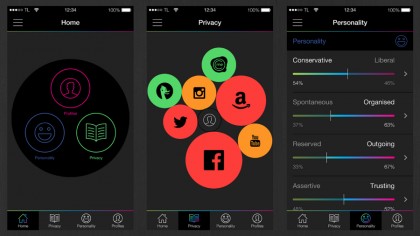Does it matter if you give away your personal data?
Do consumers care about their personal data?
How much is personal data worth?
Exactly £269 (around $420, AU$510) per household in the UK according to online advertising platform Sizmek. "Advertising facilitates a free internet," says Ben Walmsley, UK Managing Director at Sizmek. "If all advertising was removed and there was a way to distribute money to publishers in its place, it would equate to a bill of £269 per household in the UK, creating a situation of unequal access."
Sizmek is one of the supporters of The Data Deal, a new report from the Internet Advertising Bureau (IAB) that claims that digital advertising directly and indirectly benefits UK citizens.
Guy Phillipson, CEO at the IAB UK, thinks it's all about trust and innovation. "In order for industry to continue to thrive, we need the trust of consumers," he writes in the report's foreword. "Trust is a delicate thing [and] that is why the IAB and its member businesses invest in giving consumers more transparency and control over their advertising data."
Are we all to blame for the abuse of personal data?
In some ways, yes – for a better online experience a lot of us appear to be happy to trade in our personal data.
"Businesses that provide online services today understand that customers are unforgiving, and demand the most frictionless experience possible, where they can select, purchase, and consume or use content the fastest route possible," says Michael Ni, Chief Marketing Officer at ecommerce tech company Avangate.
He references time-vampires like irrelevant, interruptive adverts and paywalls, all of which are collectively frowned upon by the increasingly large online community. "Consumers have already proven that they are ready to exchange personal information for value, whether for social media, services such as those provided by mobile apps, or content," adds Ni.

Could the personal data market actually be a good thing?
"The exchange of data for a better service between consumer and business is a win-win situation," thinks Ni. "Customer experience is the basis of the mobile web and if the service is delivered right – like what Uber and Airbnb have achieved in the taxi and hotel industries – web innovations cause big disruption to legacy industries."
Are you a pro? Subscribe to our newsletter
Sign up to the TechRadar Pro newsletter to get all the top news, opinion, features and guidance your business needs to succeed!
Avangate's own research suggests that mobile commerce hasn't really got going yet, with 48% of internet users yet to pay for a service on their smartphones. So the future could see a raft of new business models that could well include the use of personal data.
However, not everyone agrees. "If personal data is currency for a free internet, consumers have had little option but to close their eyes and open their wallets, as data brokers and others exploit their position in the data ecosystem," says StJohn Deakins, Founder and CEO of Citizenme, a 'personal identity management service'.
The Citizenme iOS app shows what data is already available about you on the internet, along with settings to make changes.
"The data they see using Citizenme remains on the device and is seen only by them unless they decide to explicitly share it in some way," says Deakins, adding that users can even turn off anonymised statistics tracking on the app. "In terms of trust, this allows us to break out of the old pattern of consumers entrusting their data with some stakeholder who then, by virtue of their Terms of Service agreement, has the legal right to harvest and sell that data," says Deakins.
"We think that's fundamentally wrong … by putting consumers back in control of their own data, they become the most important stakeholder – the one with the control. They finally have a choice to participate in the commercial transaction of their data if they wish. It's a very significant power shift."
Jamie is a freelance tech, travel and space journalist based in the UK. He’s been writing regularly for Techradar since it was launched in 2008 and also writes regularly for Forbes, The Telegraph, the South China Morning Post, Sky & Telescope and the Sky At Night magazine as well as other Future titles T3, Digital Camera World, All About Space and Space.com. He also edits two of his own websites, TravGear.com and WhenIsTheNextEclipse.com that reflect his obsession with travel gear and solar eclipse travel. He is the author of A Stargazing Program For Beginners (Springer, 2015),
